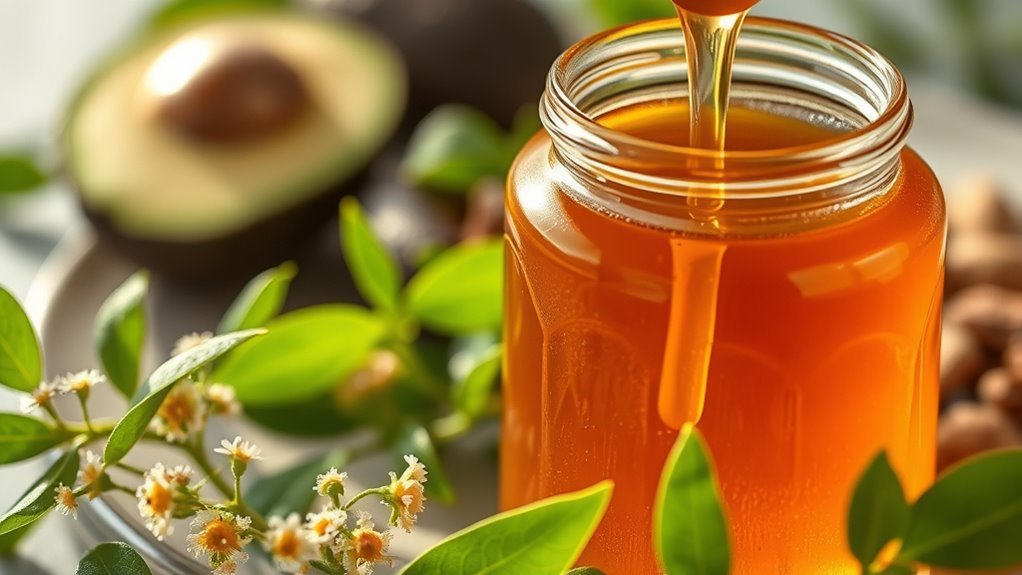Honey isn’t keto-friendly due to its high carbohydrate content, which can easily disrupt your ketosis. With about 17 grams of carbs per tablespoon and a glycemic index that can spike your blood sugar, it’s best to avoid honey if you’re serious about sticking to a low-carb lifestyle. Instead, consider using natural sweeteners like stevia or erythritol. If you’re curious about more alternatives and tips for managing cravings, there’s more to explore.
Understanding the Keto Diet

When you consider the keto diet, it’s vital to understand its fundamental principles. The keto basics revolve around a high-fat, moderate-protein, and very low-carbohydrate intake. This diet aims to shift your body into a state of ketosis, where it burns fat for energy instead of carbohydrates. To achieve this, you’ll face specific diet restrictions, primarily limiting your carb intake to around 20-50 grams per day. This means you’ll need to avoid many high-carb foods, including grains, sugars, and certain fruits. Embracing the keto lifestyle offers the freedom to explore a variety of delicious, low-carb foods while focusing on healthy fats. By understanding these essentials, you can make informed choices that align with your dietary goals. Additionally, knowing the benefits of following a Keto Diet can further enhance your motivation to stick with this dietary approach.
Nutritional Profile of Honey

When considering honey’s place in your diet, it is crucial to look at its nutritional profile. You’ll find that honey is primarily composed of carbohydrates, which can impact your keto goals, along with its glycemic index that affects blood sugar levels. Additionally, honey contains various vitamins and minerals, adding to its complexity as a natural sweetener.
Carbohydrate Content Analysis
Honey, often praised for its natural sweetness, contains a significant amount of carbohydrates that can impact a ketogenic diet. In just one tablespoon, you’ll find about 17 grams of carbs, primarily from sugars like fructose and glucose. This high carbohydrate content makes honey a challenging choice for those aiming to stay under the typical keto limit of 20-50 grams per day. If you’re seeking honey alternatives, consider options like stevia or erythritol, which provide sweetness without the same carb load. These substitutes allow you to enjoy flavors without derailing your keto goals. Ultimately, while honey may be a beloved natural sweetener, its carbohydrate sources might impede your freedom to maintain ketosis effectively. Additionally, the high glycemic index of honey can lead to rapid blood sugar spikes, making it particularly unsuitable for strict ketogenic followers.
Glycemic Index Consideration
Although many natural sweeteners are often touted for their health benefits, the glycemic index (GI) of honey raises important considerations for those on a ketogenic diet. Honey has a GI ranging from 45 to 64, depending on the type, which means it can cause a notable glycemic response. When you consume honey, your blood sugar levels can spike, leading to increased insulin levels. This reaction can hinder your body’s ability to maintain ketosis, the metabolic state aimed for in keto diets. Even small amounts of honey can disrupt your efforts to keep carbohydrate intake low. If you’re seeking to enjoy sweeteners while remaining in ketosis, it’s essential to weigh the effects of honey on your overall dietary goals carefully. Moderation is key when considering any high-carb foods on a keto diet.
Vitamins and Minerals Present
The nutritional profile of honey reveals a variety of vitamins and minerals that contribute to its health benefits. While it’s primarily known for its sugars, honey contains small amounts of essential nutrients like vitamin C, calcium, and iron. These vitamin sources help support your immune system, bone health, and overall well-being. Additionally, honey provides antioxidants, which can combat oxidative stress and inflammation. While the nutritional benefits might not make honey a primary vitamin source, they do add value to your diet, especially in moderation. If you’re considering incorporating honey into your keto lifestyle, being aware of these nutrients can empower you to make informed choices that align with your health goals.
The Glycemic Index and Its Importance

When considering foods for a keto diet, understanding the glycemic index (GI) is essential, as it measures how quickly a carbohydrate-containing food raises blood sugar levels. Foods with a low GI are often preferable, especially for those wanting to maintain stable energy levels. Honey, while natural, has a higher GI than many sugar alternatives, which means it can spike blood sugar more considerably. However, it also offers honey benefits, such as antioxidants and potential anti-inflammatory properties. If you’re looking for options that align better with a keto lifestyle, consider sugar alternatives like stevia or erythritol, which have minimal impact on blood glucose. Additionally, it is important to note that honey’s high sugar content can quickly deplete your daily carb allowance, making it a less favorable choice for those adhering strictly to a ketogenic diet. Balancing enjoyment and health is key in your dietary choices.
How Honey Affects Ketosis
While honey is often praised for its natural sweetness and health benefits, it can pose challenges for those aiming to maintain ketosis. Honey contains sugars that can spike your blood glucose levels, potentially knocking you out of ketosis. If you’re committed to a keto lifestyle, it’s essential to be mindful of your carbohydrate intake. You might consider using honey sparingly or exploring keto strategies that incorporate low-carb sweeteners instead. Balancing honey’s benefits, such as its antioxidant properties, with your carbohydrate goals is key. Ultimately, if you choose to indulge in honey, doing so in moderation and keeping track of your overall macros can help you stay on track while enjoying its unique flavor. Additionally, understanding the nutritional profile of honey is crucial for making informed dietary choices.
Alternatives to Honey on Keto
If you’re looking to satisfy your sweet tooth without disrupting your keto lifestyle, there are several alternatives to honey that you can consider. Natural sweeteners like stevia and erythritol provide sweetness without the carbs. Low carb syrups, such as monk fruit syrup or keto-friendly maple syrup, are great options too. Additionally, many keto dieters choose artificial sweeteners like aspartame to help manage cravings while maintaining their low-carb diet.
Here’s a quick comparison of some popular alternatives:
| Sweetener | Carbs per Serving | Flavor Profile |
|---|---|---|
| Stevia | 0 | Very sweet, herbal |
| Erythritol | 0 | Clean, mild sweetness |
| Monk Fruit Syrup | 0 | Fruity, sweet |
| Keto Maple Syrup | 1-2 | Rich, maple flavor |
Choosing the right alternative can keep your keto journey enjoyable and sweet!
Using Honey in Moderation
When considering honey on a keto diet, it’s important to understand its nutritional profile and how it can impact your ketosis levels. While honey contains beneficial antioxidants and has a lower glycemic index than refined sugar, its carbohydrate content can still affect your daily net carbs. Using honey in moderation, along with exploring alternatives, can help you enjoy its flavor without derailing your keto goals. Additionally, moderation is key to prevent disruptions in ketosis and maintain steady energy levels.
Nutritional Profile of Honey
Honey, often celebrated for its natural sweetness, has a unique nutritional profile that merits consideration, especially for those on a keto diet. While it’s not typically low in carbs, understanding honey’s composition can help you appreciate its nutritional benefits when used sparingly.
Here are three key components of honey:
- Natural Sugars: Honey primarily consists of fructose and glucose, providing quick energy.
- Vitamins and Minerals: It contains trace amounts of vitamins like B6, and minerals such as calcium and iron, contributing to overall health.
- Antioxidants: Honey is rich in antioxidants like flavonoids, which can help combat oxidative stress.
Using honey in moderation allows you to enjoy its flavor and benefits without derailing your keto goals.
Impact on Ketosis Levels
Understanding how honey fits into your keto journey requires a look at its impact on ketosis levels. While honey contains natural sugars, its high carbohydrate content can hinder your ability to maintain ketosis. Consuming even small amounts can lead to significant ketosis effects, especially if you exceed your daily carb limit. If you’re keen on enjoying honey’s flavor, moderation is essential. Consider using it sparingly, ensuring it doesn’t disrupt your overall macro balance. Alternatively, exploring honey alternatives like stevia, erythritol, or monk fruit can help satisfy your sweet tooth without compromising your keto goals. By being mindful of your choices, you can enjoy a bit of sweetness while staying true to your low-carb lifestyle. Moreover, understanding the potential nutritional deficiencies associated with high carbohydrate intake is crucial for maintaining overall health on a ketogenic diet.
Alternatives to Honey
While you might crave the natural sweetness of honey, there are several alternatives that can help you stay within your carb limits on a keto diet. These sugar substitutes and low carb sweeteners can satisfy your sweet tooth without kicking you out of ketosis:
- Stevia – This plant-derived sweetener is calorie-free and much sweeter than sugar, making it a popular choice.
- Erythritol – A sugar alcohol that boasts a low glycemic index, it contains nearly zero calories and doesn’t spike blood sugar levels.
- Monk Fruit Sweetener – Extracted from monk fruit, it’s a natural sweetener with zero calories and carbs, providing a great alternative to honey. Allulose, another low-calorie sweetener, is also a great option as it doesn’t spike blood sugar levels and is suitable for keto diets.
Final Thoughts on Honey and Keto
Although many people enjoy the natural sweetness of honey, incorporating it into a keto diet can be tricky. While honey has notable health benefits, such as antioxidants and antibacterial properties, it’s high in carbohydrates, which can hinder your keto goals. If you’re enthusiastic to enjoy honey’s flavor, consider using it sparingly and tracking your carb intake closely. Keto tips suggest focusing on lower-carb sweeteners like stevia or erythritol for everyday use, saving honey for special occasions. Ultimately, it’s about balance and personal choice. If you decide to indulge, opt for raw honey for added nutrients. Remember, the key to freedom on your keto journey is making informed choices that align with your lifestyle and health objectives.
Frequently Asked Questions
Can I Use Honey in Keto Baking Recipes?
You can’t use honey in keto baking recipes since it’s high in carbs. For example, if you’re experimenting with a keto bread recipe, swapping honey with a keto-friendly sweetener like erythritol or monk fruit can keep your carb count low while still providing sweetness. These honey substitutes won’t spike your blood sugar, allowing you the freedom to enjoy delicious baked goods without straying from your keto goals.
Is Raw Honey Better for Keto Than Processed Honey?
Raw honey offers some benefits over processed honey, especially regarding nutrients and antioxidants. While raw honey retains enzymes and vitamins, processed honey often loses these during refinement. However, both types are high in sugars, which can impact your keto goals. You’re better off limiting both, but if you’re choosing, raw honey might be a slightly healthier option. Just remember, moderation is key to maintaining your diet’s integrity.
How Does Honey Affect Energy Levels on Keto?
Honey can provide a quick energy boost due to its natural sugars, but its carbohydrate content may hinder your keto goals. If you consume honey, you might experience a temporary spike in energy, but this comes with the risk of exceeding your carb limit. Staying mindful of how it affects your overall energy levels is essential. If you’re looking for sustained energy on keto, consider low-carb alternatives instead.
Can Honey Cause Cravings for Sugary Foods on Keto?
Yes, honey can trigger sugar cravings on keto. When you consume honey, your body may respond by wanting more sugary foods, potentially leading to a cycle of cravings. This might make it harder to stick to keto snacks that are low in sugar. To maintain your keto lifestyle, it’s best to avoid honey and opt for alternatives that satisfy your sweet tooth without sparking those cravings. Staying mindful helps you enjoy your freedom on the diet.
Is It Safe to Consume Honey During Intermittent Fasting on Keto?
No, it’s generally not safe to consume honey during intermittent fasting on keto. Honey consumption can break your fast, disrupting fasting effects like fat burning and insulin sensitivity. Even a small amount can trigger an insulin response, leading to cravings and potential weight gain. If you’re looking for freedom in your diet, it’s best to stick to non-caloric options during your fasting window to maintain your goals effectively.
Frequently Asked Questions about Honey on the Keto Diet
1. Is honey allowed on a keto diet?
Honey is generally not allowed on a strict keto diet due to its high sugar content. A typical serving of honey contains around 17 grams of carbohydrates per tablespoon, which can kick you out of ketosis. For those following a keto diet, it’s essential to limit carbohydrate intake to around 20-50 grams per day, making honey a poor choice for maintaining ketosis.
2. Are there any alternatives to honey that are keto-friendly?
Yes, there are several keto-friendly alternatives to honey. Some popular options include erythritol, stevia, monk fruit sweetener, and allulose. These sweeteners provide sweetness without the high carbohydrate count, allowing you to enjoy sweet flavors while staying within your keto limits.
3. Can I use honey in small amounts on a keto diet?
While some people may choose to use honey in very small amounts, it’s important to be cautious. Even a small amount can contribute significantly to your daily carbohydrate intake. If you decide to include honey, track your consumption closely and ensure that it fits within your overall carb limit for the day.
4. What are the health benefits of honey?
Honey has several health benefits, including its antioxidant properties, potential to soothe sore throats, and ability to provide quick energy. However, these benefits must be weighed against its high sugar content, especially for those on a keto diet. If you are not strictly adhering to keto, moderate consumption of honey can be beneficial, but it’s best to use it sparingly if you’re trying to maintain ketosis.
5. How can I satisfy my sweet tooth on a keto diet without honey?
To satisfy your sweet tooth on a keto diet, consider using low-carb sweeteners like stevia, erythritol, or monk fruit. You can also enjoy keto-friendly desserts made with almond flour and coconut flour, which can provide a satisfying texture and flavor without high carbs. Additionally, incorporating berries in moderation can add natural sweetness while keeping your carbohydrate intake in check.
References
- https://www.healthline.com/nutrition/honey-on-keto
- https://www.ncbi.nlm.nih.gov/pmc/articles/PMC3611628/
- https://www.webmd.com/diet/obesity/honey-keto-diet
- https://www.dietdoctor.com/low-carb/honey
- https://www.journalofethics.ama-assn.org/article/honey-sweetener-or-health-risk/2019-06
- https://www.ketodietapp.com/Blog/post/Is-Honey-Keto-Friendly
- https://www.verywellfit.com/honey-and-the-keto-diet-5196226


